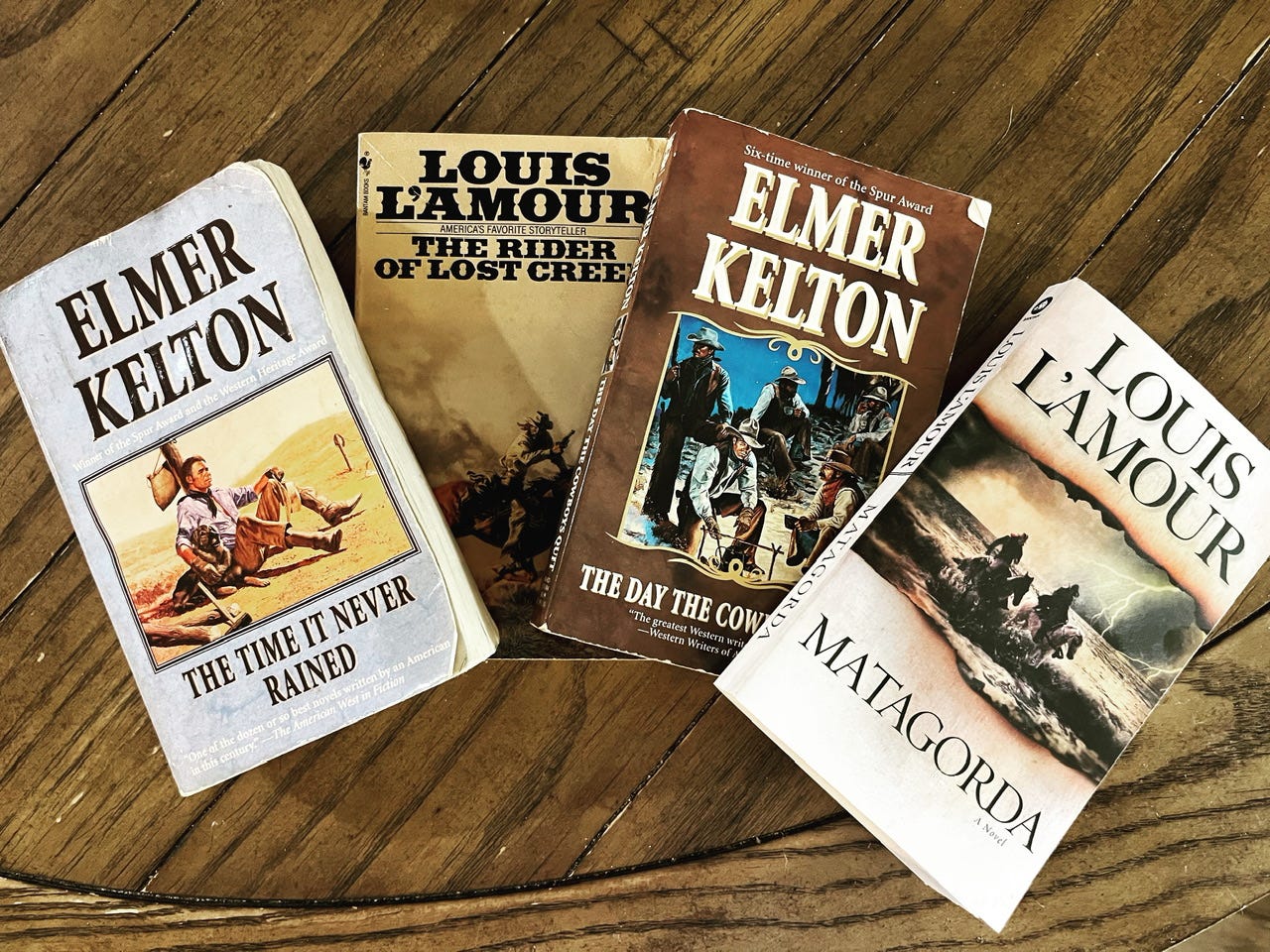Essays From West of 98: American Idol, Part 3: The Heroic Everyman
L'Amour, Kelton, and heroes of place
Louis L’Amour or Elmer Kelton? Which do you prefer?
For fans of the Western novel, it is a debate that has run for decades. Owen Wister invented the modern Western, Zane Grey took it to worldwide popularity, and after World War 2, L’Amour and Kelton became the anchors of the genre. L’Amour’s works have sold over 300 million copies. His 1988 New York Times obituary proclaimed that L’Amour was “one of the world’s most popular writers,” not just limited to the Western genre. Kelton never sold as many books, but he was often lauded by his peers as the most skilled writer in the genre.
I won’t make a Beatles vs. the Rolling Stones comparison here, because one of these bands is appallingly overrated (I’ll leave the reader to decide which is which), but it is impossible to decide which author was better. The first full-length Western I read as a child was L’Amour’s “The Daybreakers.” For several years, its protagonist and narrator Tyrel Sackett became my personal hero. I consider Kelton’s “The Time It Never Rained” to be one of the finest books ever written about Texas and it is powerfully influential to my views of community and rural America at large.
Elmer Kelton famously said L’Amour’s characters were “7 feet tall and invincible” while his own characters were “5-foot-8 and nervous.” A 2018 article in Cowboys & Indians Magazine pointed out that Kelton often repeated that line with variations on the heights and attributes, which suggests that it was a humorous comparison of their styles more than a serious value judgment on their respective works. It is an amusing illustration of style, but it also might reveal something about their own lives. L’Amour grew up amidst his parents traveling the early 20th century boomtowns of the American West. His adventures included mining, professional boxing, and traveling the world as a merchant seaman before he became a writer. The low-key Kelton grew up on West Texas ranches and edited the farm and ranch page of the San Angelo Standard-Times, Sheep and Goat Raiser Magazine, and Livestock Weekly even as he became an acclaimed novelist. L’Amour wrote about heroism up and down the frontier, while Kelton wrote about heroism in place, most especially in his beloved West Texas.
In L’Amour’s works, we are inspired by heroic deeds. Sometimes his heroes are larger than life and sometimes they are ordinary people cast into heroic situations. They face down the outlaw in the street, they rescue the damsel in distress, or they save the wagon train from annihilation. Kelton’s heroes are more often ordinary people cast into difficult situations. Sometimes they rise to the occasion, sometimes they fall short in some ways. If you’ve ever read “The Time It Never Rained,” you know it does not have a Walt Disney ending.
As I have written over the last few weeks, the cowboy ideal can be something positive to uphold or a false idol to worship for the wrong reasons. In L’Amour and Kelton, we find just that. L’Amour’s heroes can push us to be the best versions of ourselves when the chips are down and adversity surrounds us. Kelton’s heroes remind us that regular people can be confronted with difficult situations and they need not be seven foot tall to prevail.
The cowboy is not a comic book hero with superpowers attained from some mysterious source. The cowboy is just a human, the same as you and me. So, to the original question: L’Amour or Kelton? I’ll choose both. If a person were to read a healthy dose of both L’Amour and Kelton (and I have), they would be reminded that heroic deeds are important, but also that they can come from regular people and regular places. Striving to rise to the occasion, for family and community, will make both us and our places better as a result.
Next week: Larry McMurtry and the accidents of mythology.
James Decker is the Mayor of Stamford, Texas and the creator of the West of 98 website and podcast. Contact James and subscribe to these essays at westof98.substack.com and subscribe to West of 98 wherever podcasts are found.





I will say Kelton is my favorite, even though I never read anything by him until I lived in Texas (1999-2008). I agree with your heroic everyman analysis. It can be a saving grace, or a curse, depending on the "reader."
Even though my wife (from Comanche) and I now live in Northern Minnesota, we appreciate, and enjoy, your insight.